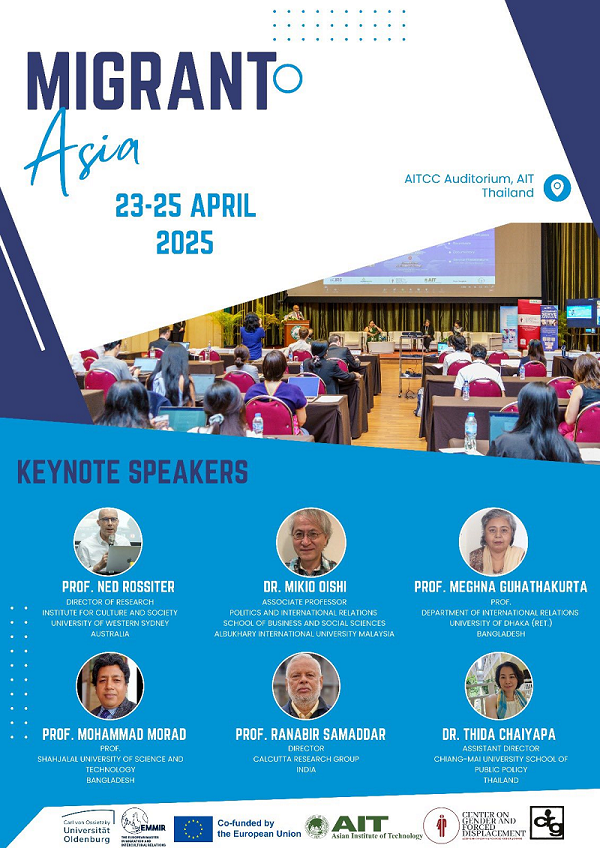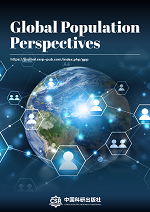Scholar Spotlight: Voices from Prof. Mohammad Morad

We are pleased to share the academic footprints of our editorial board member, Prof. Mohammad Morad, who gave a keynote speech at the Migrant Asia: International Conference on Migrants in the Making of Asia. Co-organized by the European Master in Migration and Intercultural Relations (EMMIR), the Mahanirban Calcutta Research Group (CRG), and the Center on Gender and Forced Displacement (CGFD), the conference took place at the Asian Institute of Technology (AIT) from April 23 to April 25.

This conferences brought together scholars from Asia, Europe, and Africa, positioning migration as a crucial prism through which to view regional cooperation, humanitarian governance, and labor systems. Prof. Morad’s presentation, “Understanding undocumented migration from Bangladesh to Europe: the role of transnational networks”, focused on transnational ties, geographical imagination, and the culture of migration.
Abstract of the Presentation:
Bangladesh, like many resource-poor countries, has emerged as a notable source of undocumented migrants, ranking among the largest groups attempting to reach Europe― primarily via the perilous journey across the Mediterranean Sea and various land borders. Drawing on multi-sited qualitative research conducted in Italy and Bangladesh, this study aims to understand the role of transnational social networks in facilitating and sustaining undocumented migration from Bangladesh to Europe. It analyses the migration process in three phases: the pre-migration phase (shaping migration decisions and preparation), the migration phase (crossing borders through the transit countries), and the post-migration phase (acclimatising in Italy).
Findings demonstrate that transnational networks not only create a bridge between migrants and non-migrants but also cultivate a “culture of migration,” fostering an imagined “European lifestyle” among non-migrants. Our participants grew up witnessing this ‘culture of migration’- seeing people close to them migrate and glorify particular geographical locations as ideal places to live. Migrants’ apparent affluence, social recognition, seemingly peaceful and prosperous lifestyles and their ability to manipulate surroundings in their favour easily draw the attention of non-migrants. As a result, many non-migrants come to believe that certain geographical locations, particularly in Europe, possess everything they are yearning for. In addition to prior migrants, transnational broker syndicates, who are the primary beneficiaries of this process, actively entice, encourage, and assist aspirant migrants in undertaking the life-threatening journey of illegal border crossings. They carefully exploit the emotions of aspiring migrants, leveraging their transnational networks with a particular EU country, which has become synonymous with a ‘dreamland’ for many. However, Bangladeshi migrants in this study, whether they successfully reached Europe or were forced to return, frequently endured severe exploitation, physical and psychological abuse, and extreme insecurity. In light of these risks, the Bangladeshi government must take the initiative to raise awareness about the potential dangers of unauthorised migration, debunk myths about specific geographical locations, and advocate for alternative opportunities. Additionally, the government should explore new, safer migration pathways to enable individuals to pursue their aspirations without undue risk.
To conclude, this study argues that a transnational networks approach is essential for understanding the non-economic yet catalytic drivers of migration, offering a more holistic and nuanced perspective on international migration. Without addressing these social factors, discussions on the causes of undocumented migration would remain incomplete.
Bio Statement:
Dr. Mohammad Morad is a professor of Sociology and the director of the Writing Centre at Shahjalal University of Science and Technology (SUST) in Sylhet, Bangladesh. He holds a PhD in Sociology under the program of Social Sciences: Interactions, Communication, and Cultural Constructions from the University of Padova, Italy, which included a visiting research period at the University of Leeds in the United Kingdom, supported by the Italian doctoral scholarship. His doctoral dissertation, Multiple Migrations: Social Networks and Transnational Lives of Italian Bangladeshis in Europe, is grounded in multi-sited qualitative research conducted in Italy and the UK. This study enriches migration scholarship by examining the step-by-step migration trajectories of naturalised EU citizens and offering a nuanced analysis of the role of social networks and transnational ties in shaping multiple migratory movements across Europe.
Dr. Morad is also a recipient of the prestigious Erasmus Mundus Scholarship (Category A), through which he earned a second Master’s degree in Migration and Intercultural Relations (EMMIR). This transdisciplinary program was pursued across the University of Oldenburg (Germany), the University of Stavanger (Norway), and the University of Nova Gorica (Slovenia). His MA thesis, Formation of Diaspora through Diasporic and Transnational Linkages: The Case of Bangladeshi Migrants in Italy, explores the formation of the Bangladeshi diaspora by analysing key dimensions, including dispersion, homeland connection, and the preservation of ethnic identity in the host society.
His research interests include international migration, migrant labour, social networks, transnationalism, diaspora formation, refugee mobility, and intra-EU migration. He has conducted extensive fieldwork in Italy, Germany, Slovenia, the United Kingdom, and Bangladesh. His scholarly work has been published in several leading peer-reviewed international journals such as Population Space and Place, The British Journal of Sociology, International Sociology, International Migration, Ethnic and Racial Studies, Labor History, and International Review of Sociology. He is currently the principal investigator of a research project titled Bangladeshi Educated Youth on the Move: Transnational Networks and Geographical Imagination in South-North Migration by the SUST Research Centre.
Posted: August 16, 2025





